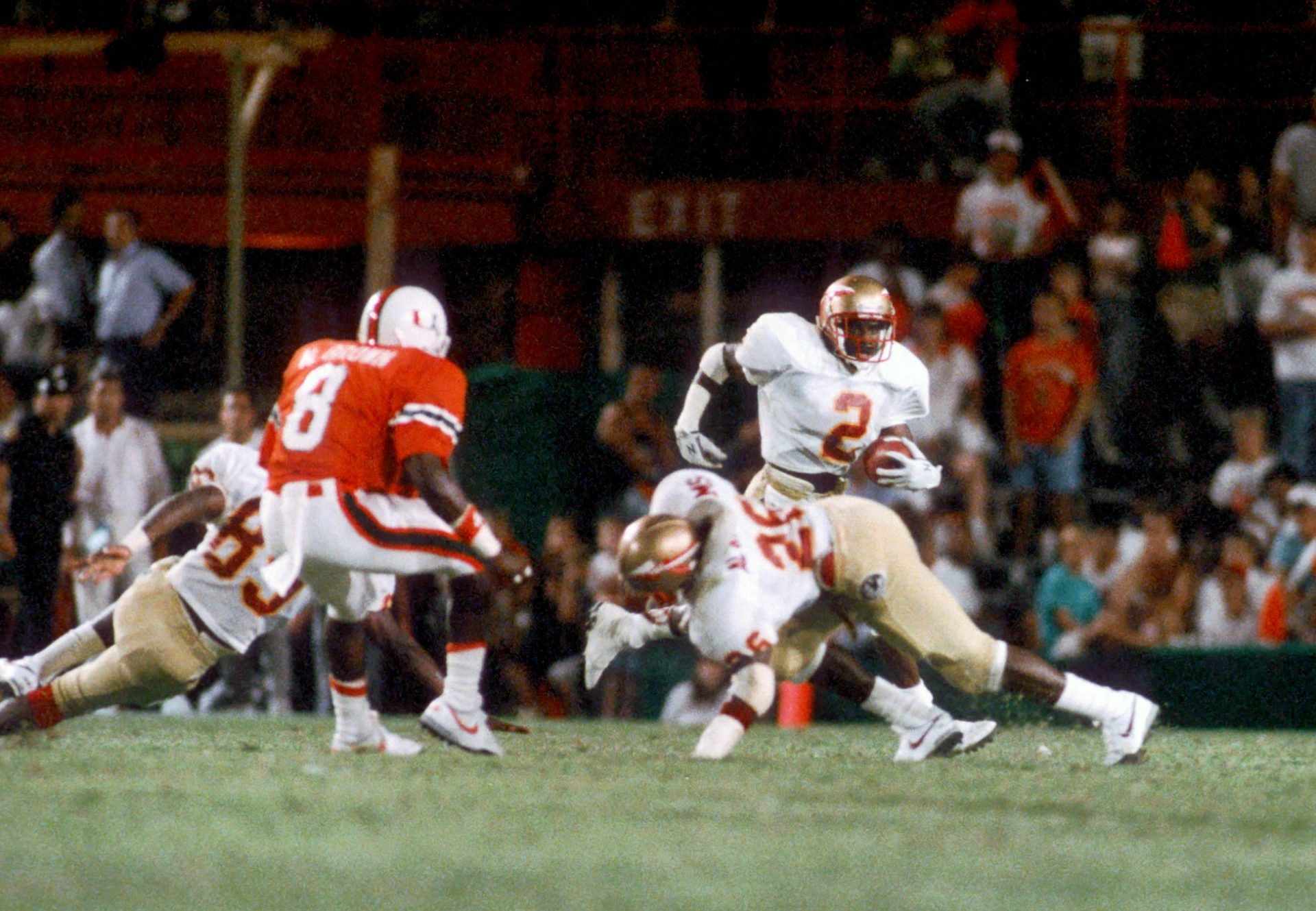For the younger generation, Deion Sanders is one of America’s most polarizing and famous college football coaches. Despite limited on-field success, the head ball coach has put the University of Colorado football program back at the forefront of the college football conversation.
The younger generation may not know that Sanders was just as, if not more polarizing, during his playing days at Florida State University.
Before he was “Coach Prime,” he was known as “Prime Time,” the dazzling play-making speedster architecting several highlight plays for the Seminoles in the ’80s.

Looking Back at the College Football Career of Deion Sanders
A product of Fort Myers, Fla., Sanders decided to showcase his skills close to home at Florida State University, where he could continue pursuing his three passions: football, baseball, and track and field. Many speculated if he would be as impactful at all three sports at the college level as he was in high school.
Sanders, widely known as “Prime Time,” left an indelible mark on the football field at Florida State University in the ’80s, earning his place in the College Football Hall of Fame in 2011.
But he wasn’t just a football star in college. Sanders’ journey at Florida State was remarkable from the start, as he excelled in football, baseball, and track.
As a freshman, Sanders quickly established himself as one of the top athletes at Florida State. He started in the Seminoles’ secondary in four games, played in the baseball team’s outfield, and contributed to the track and field team’s conference championship win.
Guided by head coach Bobby Bowden on the football field, Sanders earned third-team All-American honors in 1986 and became a consensus All-American cornerback in 1987 and 1988. Over his college career, he recorded 14 interceptions, including three in bowl games, and set a school record with a 100-yard interception return for a touchdown, edging out Fred Biletnikoff’s previous mark.
His outstanding performance in 1988 earned him the Jim Thorpe Award, recognizing him as the top defensive back in the nation. Sanders also dominated as a punt returner, leading the country in punt return average that same year and setting a new Florida State record for career punt return yards.
MORE: Simulate the College Football Season with CFN’s College Football Playoff Predictor
During his first year, Sanders saw limited action on the football field, starting just four games and primarily contributing as an extra defender in zone and nickel packages. Despite the limited role, he displayed flashes of brilliance with an interception and four pass breakups.
By his sophomore year in 1986, Sanders had earned the complete confidence of FSU coach Bobby Bowden. He was immediately slotted into the starting lineup, where he thrived under the spotlight.
Sanders recorded four interceptions, eight pass deflections, and 61 total tackles (34 solo, 27 assisted). His performance earned him third-team All-American honors, securing his legacy as one of the top players in college football during the 1980s.
Sanders built on his impressive sophomore season with an almost identical junior year performance, solidifying his status as a prospect that NFL scouts needed to watch closely.
However, it was in his senior year that Sanders truly shined. He claimed the Jim Thorpe Award, recognizing him as the nation’s most outstanding defensive back.
A true ballhawk, Sanders snagged five interceptions that season and led the country in punt return yardage. Sanders capped off his college career with a memorable play that etched his name in Florida State history — securing a game-saving interception with just five seconds left to lift FSU over Auburn in the Sugar Bowl, his final collegiate game.
By the end of his college career, Sanders had amassed 126 punt returns for 1,429 yards and three touchdowns, along with 14 interceptions returned for 287 yards and three scores.
Sanders’ 14 interceptions ranked second in school history at the time of his graduation. Regarding Sanders’ remarkable talent, Bowden later remarked that Sanders was his “measuring stick for athletic ability.”
One of the Greatest Athletes of All Time
Sanders is regarded as among the greatest athletes ever, and his collegiate athletic resume is unparalleled.
When his athletic career ended at FSU, Sanders had earned All-America honors as a sprinter on FSU’s 4×100 relay team, qualified for the Olympic time trials, and won a conference championship in track and field.
He also competed in the College World Series as an outfielder on the baseball team. Add these to his accolades on the gridiron at Florida State, and you are looking at one of the most extraordinary collegiate athletic careers ever.
These accomplishments set the stage for Sanders’ remarkable professional career. Selected fifth overall in the 1989 NFL Draft, Sanders played 14 seasons in the NFL, suiting up for the Atlanta Falcons, San Francisco 49ers, Dallas Cowboys, Washington, and Baltimore Ravens.
Simultaneously, he spent nine seasons in Major League Baseball, playing for the New York Yankees, Atlanta Braves, Cincinnati Reds, and San Francisco Giants. Sanders is the only athlete in history to compete in a Super Bowl and a World Series.
His NFL career was illustrious, earning him a spot in the Pro Football Hall of Fame in 2011. Sanders played in eight Pro Bowls, was named the 1994 AP Defensive Player of the Year, and won two Super Bowls.
College Football Network has you covered with the latest news and analysis, rankings, transfer portal information, top 10 returning players, the 2024 college football season schedule, and much more!

